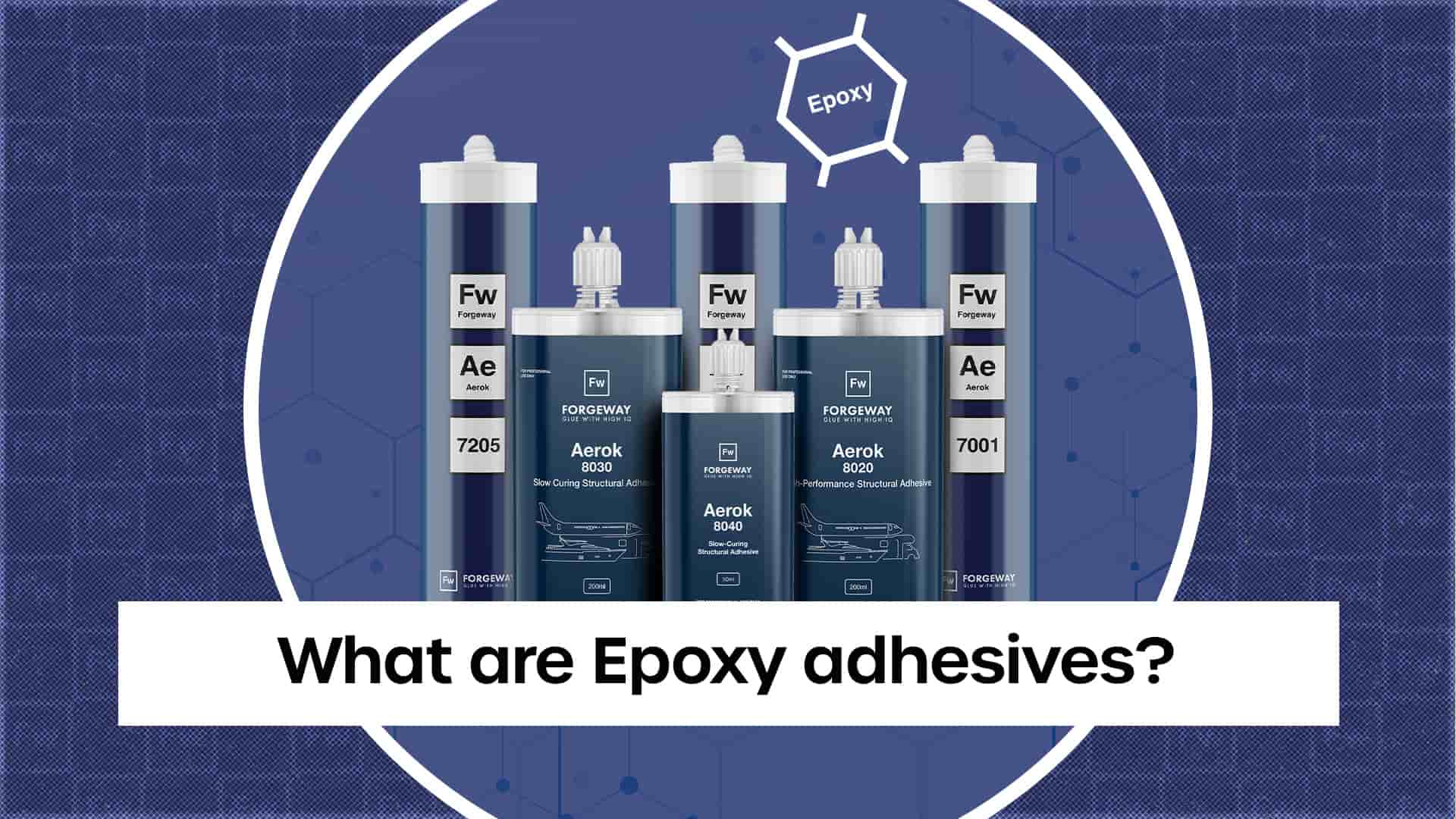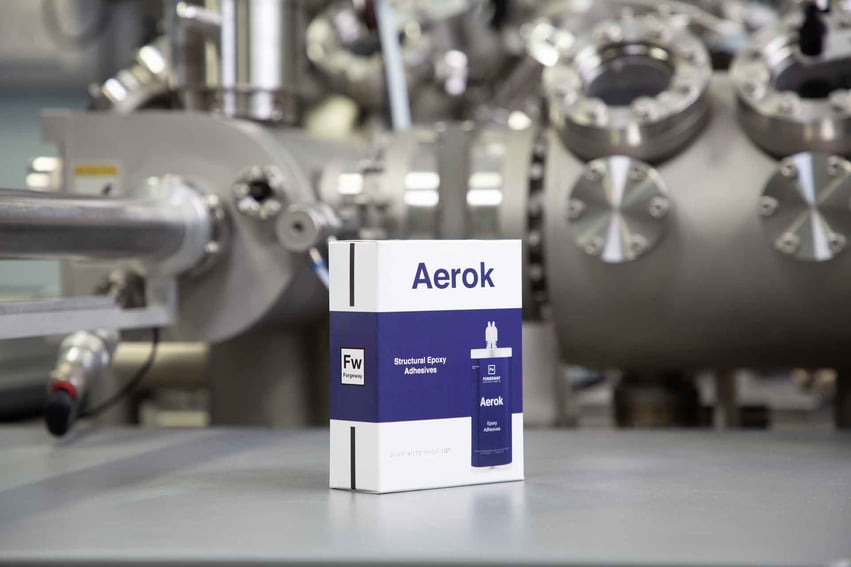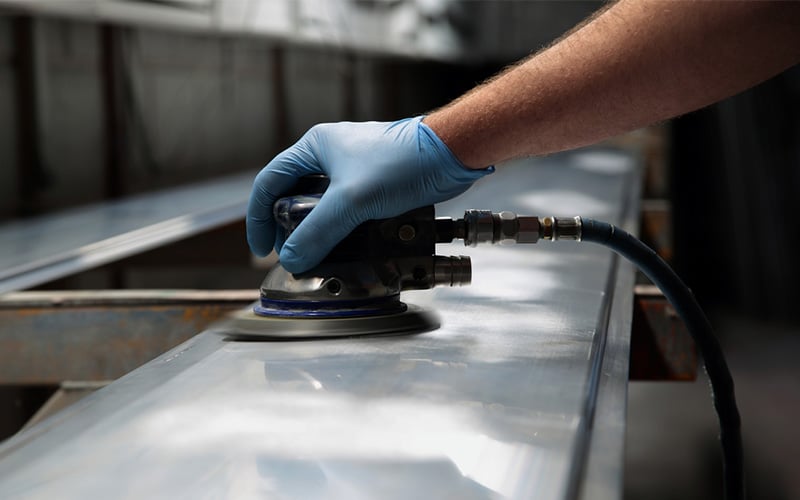Epoxy Adhesives: What are they and where can you use them?

You have heard about using epoxy adhesives (also known as epoxies) as a potential bonding solution. Now you want to find out a little more about them and determine whether they might be a good fit for you.
Here at Forgeway, we manufacture over 3000 tonnes of adhesives every year. Epoxies make up one of the core product ranges we manufacture, so it’s fair to say we know a thing or two about epoxies.
This article will discuss all things epoxy adhesives so you can determine whether they are worth considering as a bonding solution for your application.
What are epoxy adhesives?
To begin with, we should clarify that epoxies are structural adhesives. This means they become part of the structure they are bonded to.
Epoxy adhesives consist of two components; epoxy resin and a hardener (usually amine).
One-part epoxies have the latent amine hardener already mixed in with the epoxy resin. The one-part then requires elevated temperature to cure. However, two-part epoxies have the resin and hardener separate. These two parts will mix as you apply them causing the hardener and epoxy resin to interlink and then cure without the need for elevated temperature.

The other thing to note about epoxies is that the epoxy resin itself can be different depending on what you want from the glue. For example, if you want more viscosity and greater chemical resistance, you can use a different type of resin.
The three main types of epoxy resins are;
- Bisphenol A
- Bisphenol F
- Novalac
Where can you use epoxy adhesives?
You can use epoxy adhesives for bonding most applications. Although we would say that there are some factors about epoxies which mean they will not always be a good fit.
If you are bonding dissimilar materials (such as plastics to metals) and require a strong and durable bond, epoxies might be a good fit for you. With epoxy adhesives, you cannot bond some substrates such as low surface energy (LSE) plastics. This is not an issue with epoxy adhesives alone; most adhesives will not bond to LSE plastics.
If the substrates are suitable (like if they aren’t LSE) and you require a very strong bond that lasts for a long time, you will find epoxies to be a good fit. At this point, you will be wanting to know some examples of where epoxy adhesives were used so we listed a few for you.
- An aviation manufacturer used epoxy adhesives to bond the composite fuselage. The temperature resistance and fire retardance of epoxies were the two main factors behind the decision to use epoxy adhesives.
- A different aerospace manufacturer needed an epoxy adhesive to bond stainless steel to polyethyleneimine (a plastic known as PEI). They chose the epoxy adhesive because of its ability to withstand extreme temperature changes and exposure to chemicals.
These examples will give you an idea of where you might typically be able to use epoxy adhesives. However, there are multiple other benefits and drawbacks to using epoxy adhesives which we will discuss in the next section.

What are the advantages of using epoxy adhesives?
Epoxies are most well-known for their strength. However, there are several other advantages to using epoxies. We will go through them in this section and describe why they actually matter.
- Epoxies are very strong as we have already explained. But we should explain just how strong they are. They are the strongest glue you can get. And whilst strength isn’t everything, it is still a major factor when choosing a suitable adhesive option. If you like technical facts though, the fact that some epoxies can have a strength of up to 30 Mpa will be of interest. This means epoxies can reach a sufficient strength to replace welding.
- Epoxies have good chemical resistance. Earlier, we discussed the different types of epoxy resins you can get (Bisphenol A/Novalac etc). These resins can offer differing amounts of chemical resistance too. All epoxies will have good chemical resistance though. This chemical resistance means they are not susceptible to breaking down (degradation) when exposed to chemicals.
- Epoxies have good fatigue resistance. When an adhesive is put under a lot of stress a number of times, it can become fatigued. This fatigue weakens the adhesive, reducing its strength over time. Epoxies are able to maintain their strength very well and are not susceptible to fatigue.
- Epoxies can bond to dissimilar materials. Yes, we have already mentioned this and yes, this isn’t a strength of just epoxies. But it is worth mentioning again because it is an important factor to remember. So epoxies can achieve the highest strength bond, and you don’t have to have the same substrates to achieve this strong bond.

What are the disadvantages of using epoxy adhesives?
It might seem like epoxies are the cure to your bonding problems. And whilst they are a very good option, there are a few things you should be aware of first.
- The cure time is usually gradual and can be affected by temperature. As we have already described, not all epoxies are the same. There are some epoxies that have a very fast cure time. But in general, the cure time is gradual, and it can take a few days before reaching fully cured. The lower the temperature, the slower the cure will be. You must make sure you are curing the epoxy at the right temperature.
- Some formulations are very brittle. Whilst there are some formulations that are more flexible, most epoxies will be brittle. This lack of flexibility is a problem if you are bonding something that is likely to vibrate or move. Vehicles are a good example of where a brittle epoxy would not be a good bonding option. A more flexible adhesive (like MS polymer) would be a better option in this instance.
- Epoxies exotherm as they cure. This isn’t always an issue. However, if you need to use glue in large quantities (to fill a large void), using an epoxy might not be the best choice due to the exotherm. A large exotherm can damage substrates and even affect the bond.

How much do epoxies cost?
We’ve mentioned the different variations of epoxies and the different types will affect the cost too.
- A typical high-strength, but more brittle epoxy will cost between £40-£50 for a 400ml cartridge.
- A high-strength but flexible epoxy will cost between £30-£40 for a 200ml cartridge.
Is an epoxy adhesive a good fit for me?
Now you know a bit more about epoxies, you will want to know whether they are a good fit for you.
As we manufacture and supply epoxy adhesives to companies around the world, we know that they are an excellent adhesive option if you want a strong, durable, and chemical resistant adhesive.
However, we also know that they aren’t a good fit if you want a fast curing and highly flexible adhesive.
The decision ultimately comes down to you and what you want. If you still aren’t sure what you want, you can get in touch with an expert who will help you decide which adhesive would be best for you.
If you want to do a bit more research into some of the other structural adhesives, you can download our ebook by following the link below.
Migelo turns technical jargon into clear, easy-to-read content. Forgeway’s mission is to address every question our customers and prospective clients have, even the ones they might hesitate to ask.
Topics:



